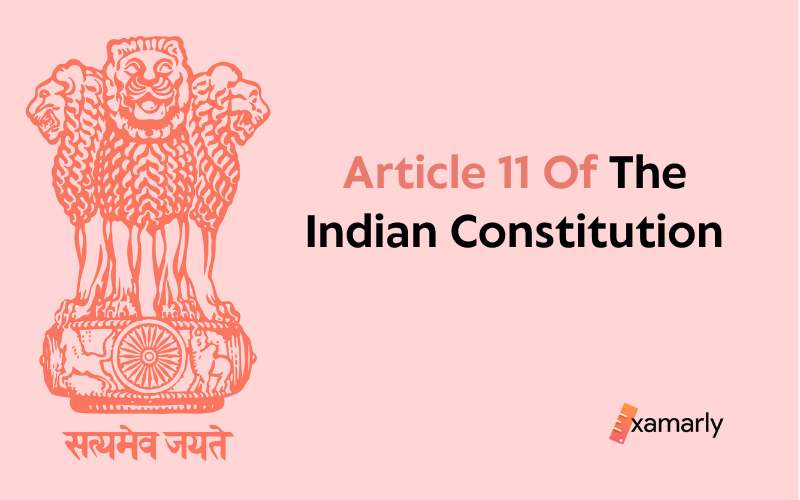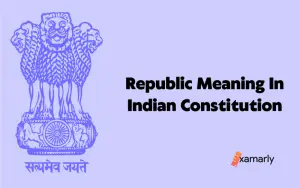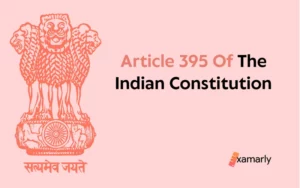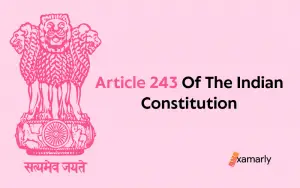Parliament will enact laws governing citizenship rights as per Article 11 of the Indian Constitution. Nothing in the aforementioned provisions of Part II shall limit Parliament’s ability to pass laws governing the acquisition and loss of citizenship, as well as any other issues connected to citizenship. Additional information regarding Article 11 of the Indian Constitution is covered in the article that follows.
- What Is Article 11 Of The Indian Constitution?
- Different Articles Addressing Citizenship
- Principal Grounds For Acquiring Citizenship
- Citizenship By Descent
- Citizenship By Birth
- Citizenship By Registration
- Citizenship By Naturalization
- Citizenship Acquisition By Incorporation Of Territory
- Termination Of Indian Citizenship
- Conclusion
- FAQs
What Is Article 11 Of The Indian Constitution?
Article 11 of the 1949 Indian Constitution states that the right to citizenship may be regulated by law. Nothing in the aforementioned provisions of this Part shall interfere with Parliament’s authority to establish any regulations regarding the acquisition and loss of citizenship, as well as any other matters related to the concept of citizenship PART III GENERAL FUNDAMENTAL RIGHTS.
Different Articles Addressing Citizenship
The legal status of a person as a legitimate citizen of a state or as a member of a country is known as citizenship. The Indian Constitution’s Articles 5 through 11 deal with the idea of citizenship for people. To fully enjoy any State in which a citizen has civil and political rights, one must be a citizen of that State.
| Articles On Citizenship | Articles Deals With |
| Article 5 | Citizenship at commencement of the Constitution. |
| Article 6 | The sixth citizenship article deals with the Citizenship rights of certain persons who have migrated to India from Pakistan (rights to migrants) |
| Article 7 | Rights of citizenship of certain migrants to Pakistan. |
| Article 8 | Rights of citizenship of certain persons of Indian origin residing outside India. |
| Article 9 | Persons voluntarily acquiring citizenship of a foreign State not to be citizens. |
| Article 10 | Continuance of the rights of citizenship |
| Article 11 | Parliament to regulate the right of citizenship by law. |
Principal Grounds For Acquiring Citizenship
Citizenship By Descent
- A person shall be regarded as an Indian citizen if they were born outside of India on or before 26 January 1950 but before 10 December 1992. But only under the condition that at the time of his birth, his father must be an Indian citizen.
- Any parent (mother or father) of a child born on or after December 10, 1992, but before December 3, 2004, must be an Indian citizen.
- Following the Citizenship Amendment Act of 2003, the government issued a decree saying that a child should not be considered Indian by his ancestry alone. Within one year after birth, registration was required by law. The government may prolong it for however long is necessary.
Citizenship By Birth
- A person is considered to be an Indian citizen if they are born on Indian soil.
- A person who was born on or after January 26, 1950, but before July 1, 1987, regardless of their parent’s nationality. It is known as jus soli (right of soil).
- A person who was born before 3 December 2004 but on or after 1 July 1987. At the moment of birth, either parent of the child should be an Indian citizen. It’s known as jus sanguine (right of blood or descent).
- Regardless of where the kid was born, citizenship is awarded to a person based on the nationality of either of their parents, whether they are Indian or not.
- Someone who was born on or after December 3, 2004. At the moment of birth, the child’s parents must both be citizens of India.
- A person cannot become an Indian citizen if either of his parents is an enemy alien, foreign diplomat, or illegal immigrant.
Citizenship By Registration
- If the applicant is of Indian descent and was typically a resident of India for seven years before submitting their registration application.
- If the applicant has lived regularly in India for seven years before submitting the registration application and is married to an Indian citizen.
- If the person is a minor and their parents are Indian citizens.
- A person who has lived in India for a year before applying for registration and whose parents were earlier Indian citizens after the country’s independence.
- If a person has lived abroad for a year before applying for registration and is registered as an overseas citizen of India (a foreigner of Indian descent who is granted permission to work and live in the territory of India).
Citizenship By Naturalization
- Citizenship can be obtained by submitting an application to the central government.
- An individual must meet the requirements of the third schedule of this act in order to award citizenship to a person.
- The applicant for a citizenship certificate must be of high moral character, be fluent in one of the languages listed in the eighth schedule of the Indian Constitution, be a resident of India legally, and have given up any prior citizenship.
- The applicant must have spent 11 of the previous 14 years in India, in addition to the year just before submitting their application.
Note: Following the Citizenship Amendment Act of 2019, the period of time from eleven to five years has been reduced, along with the year immediately preceding the application. This brings the total number of years to six. - The government may waive the requirements listed in the third schedule of this act if the person has made a noteworthy contribution to or provided service in the fields of the arts, science, literature, or human growth.
Citizenship Acquisition By Incorporation Of Territory
- By publishing an official gazette, the central government must declare any territory or state to be a part of the Union of India.
- Numerous territories, including Goa, Sikkim, Puducherry, Daman, and Diu, were annexed by India, giving their inhabitants Indian citizenship.
Termination Of Indian Citizenship
The Indian Constitution outlines three ways in which someone may renounce their citizenship, which they obtained with the aid of the 1955 Citizenship Act.
- Termination– A citizen of India loses his Indian citizenship automatically if he freely acquires citizenship in another nation.
- Renunciation– One may consciously choose to renounce the term citizenship. Every minor child of that person loses Indian citizenship upon the declaration of that individual’s renunciation of citizenship. Such a child can, however, reclaim his Indian citizenship within a year of reaching legal adulthood by declaring his desire to do so.
- Deprivation– In specific circumstances, the Indian government has the power to revoke a person’s citizenship. This does not, however, apply to all citizens. Only those who became citizens by registration, naturalization, or just by virtue of Article 5 Clause (c) are subject to it.
Conclusion
Even if things are accumulated and achieved by the laws as established by the government, obtaining citizenship is not the end of all. A person must meet several requirements to be eligible. The Citizenship Act specifies three ways in which it might be canceled, including the renunciation of citizenship (1955).
Nobody’s rights are given an infinitely high priority. This is done to prevent the abuse of the authority granted to Indian citizens. Apart from this, our nation’s Constitution only mentions single citizenship. This indicates that there is no distinction between center- and state-level citizenship.
FAQs
What Is Renunciation Of Citizenship?
Giving up an Indian passport signifies the renunciation of Indian citizenship. Indian citizens who acquire U.S. citizenship or citizenship of another country must petition for renunciation of Indian citizenship and hand in their Indian passport because India does not permit Indian dual citizenship under the Indian Citizenship Act. Anyone who has renounced their Indian citizenship is not allowed to keep their Indian passport; those who do not relinquish their passport may be subject to sanctions.
When Can Your Citizenship Get Terminated?
Citizen of India loses their Indian citizenship if they voluntarily get the citizenship of another nation (termination of citizenship). If a question arises about whether someone has acquired the citizenship of another country when or how it is to be determined by such authority and in such a manner as may be prescribed by the rules. During the war period, this provision does not apply to an Indian citizen who acquires the citizenship of another country in which India may be engaged voluntarily.
Thus, we can conclude that citizenship in India can only be revoked if a citizen also obtains citizenship in another nation; it cannot be revoked in times of emergency, war, or aggression by another nation.
Can Any Get Deprived Of Citizenship In India?
The Citizenship Act of 1955 and the rules promulgated thereunder serve as the primary legal framework for nationality deprivation in India. The Central Government has the authority to strip someone of their citizenship under Section 10(2) of the Act. However, this ability to revoke citizenship only applies to those who obtained it through naturalization, registration, or regular residence in Indian territory for five years before the Constitution’s start. This means that under this clause, people who are born in Indian territory or to parents who are Indian nationals cannot lose their citizenship (jus soli and jus sanguinis citizenship).
What Is OCI?
The OCI, which stands for Overseas Citizenship of India, is an Indian card that grants the holder a multiple-entry, perpetual visa for India with no time limits. This OCI is a smart card that will expedite your immigration clearance as well as your use of consular services. OCI Card is sometimes referred to as the Overseas Citizenship of India and the OCI Registration Certificate. It must be requested through a VFS facility in the UK and is typically referred to OCI.






